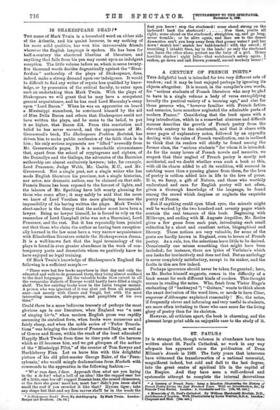A CENTURY OF FRENCH POETS"
Tars delightful book is intended for two very different sets of readers; and it may be best enjoyed perhaps by ignoring its objects altogether. It is meant, in the compiler's own words, for "serious students of French literature who may be glad to have in a single volume a body of verse exemplifying broadly the poetical variety of a teeming age," and also for those persons who, "however familiar with French fiction and memoirs, have somehow neglected the admirable poets of modern France." Considering that the book opens with a long introduction, which in a somewhat abstruse and difficult manner describes the growth of French poetry from the eleventh century to the nineteenth, and that it closes with some pages of explanatory notes, followed by an appendix dealing with the rules of French versification, one is inclined to think that its readers will chiefly be found among the former class, the "serious students" for whom it is intended. As for the many lovers of French novels and memo:rs, we suspect that their neglect of French poetry is mostly not accidental, and we doubt whether even such a book as this, with all its charm added to all its erudition, will succeed in catching more than a passing glance from them, for the love of poetry is seldom added late in life to the love of prose. It is, we fancy, a gift of Nature, and those who worthily understand and care for English poetry will not often, given a thorough knowledge of the language, be found among the crowd which despises or neglects the exquisite poetry of France.
But if anything could open blind eyes, the miracle might well be worked by the two hundred and seventy pages which contain the real treasure of this book. Beginning with Millevoye, and ending with M. Auguste Angellier, Mr. Eccles gives a few gems from each poet, introducing each small collection by a short and excellent notice, biographical and literary. These notices are very valuable, for some of the poets are hardly known in England, even to lovers of French poetry. As a rule, too, the selections leave little to be desired. Occasionally one misses something that might have been included; for instance, there are lyrics of Verlaine's which one looks for instinctively and does not find. But an anthology is never completely satisfactory, except to its maker, and the faults in this are few indeed.
Perhaps ignorance should never be taken for granted ; here, as Mr. Eccles himself suggests, comes in the difficulty of a book meant for such different kinds of readers. This thought occurs in reading the notes. Who, fresh from Victor Hugo's enchanting (if "hackneyed ") " Guitare," wants to think about the exact derivation of the word ticoes, or needs to have Cesar, empereur d'Allemagne explained reasonably ! No; the notes, if frequently clever and informing and very useful to students, are more often irritating to those who care more for the living glory of poetry than for its skeleton.
However, all criticism apart, the book is charming, and the pleasant large print adds an enjoyable ease to the study of it.






























































 Previous page
Previous page